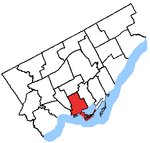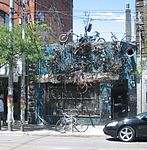Trinity—Spadina

Trinity—Spadina was a federal electoral district in Ontario, Canada, that was represented in the House of Commons of Canada from 1988 to 2015. It generally encompassed the western portion of Downtown Toronto. Its federal Member of Parliament (MP) was Olivia Chow of the New Democratic Party. She defeated Tony Ianno of the Liberal Party of Canada in the January 23, 2006 election. On March 12, 2014, Chow resigned from her seat in order to run for the 2014 Toronto mayoral election, and the seat was won by Adam Vaughan, in a by-election. The riding has long been a battle ground between the NDP and the Liberals, with the Liberals recently winning both federally and provincially. Major landmarks within the riding included the western portion of the University of Toronto, the CN Tower, Rogers Centre (formerly Skydome), Air Canada Centre, the Canadian Broadcasting Centre, 299 Queen Street West, the Toronto Eaton Centre, the Metro Toronto Convention Centre, Toronto City Hall, Kensington Market, Chinatown, Christie Pits, Trinity Bellwoods Park, the southern portion of Bay Street and Palmerston Boulevard. The riding contained Toronto's Chinatown, Koreatown, Little Italy, and Little Portugal. The northern section of the riding was the Annex district, while the eastern edge contained part of the University of Toronto and thousands of students.
Excerpt from the Wikipedia article Trinity—Spadina (License: CC BY-SA 3.0, Authors, Images).Trinity—Spadina
Markham Street, Toronto
Geographical coordinates (GPS) Address Nearby Places Show on map
Geographical coordinates (GPS)
| Latitude | Longitude |
|---|---|
| N 43.65 ° | E -79.406 ° |
Address
Markham Street 81
M6J 1T8 Toronto
Ontario, Canada
Open on Google Maps









